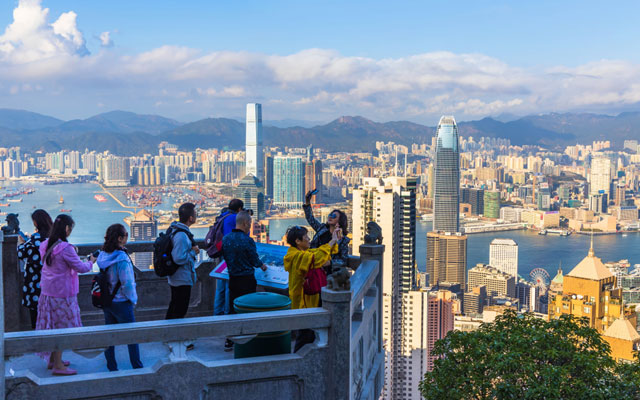Hong Kong’s travel and tourism players are urging the government to roll out a fresh round of relief measures to help the battered industry counter the triple whammy of prolonged protests, the unresolved US-China trade war, and the global Covid-19 pandemic sweeping the globe.
The city’s severely-hammered tourism sector reached a new monthly low in February, with arrivals plunging to 199,000, down more than 96 per cent from the same month last year, according to the Hong Kong Tourism Board.

On February 8, the government announced major border closures to further stem the Covid-19 spread.
The ensuing massive cancellations and postponements has dealt a further blow to the city’s tourism industry already struggling to survive, and resulted in two travel agencies, We Fly and GoGoGo Travel, folding in March amid the coronavirus chaos.
In a Facebook post, We Fly said that it ceased trading as its major shareholder had filed a winding-up petition to the court. It also asked consumers to contact Travel Industry Council (TIC) for assistance if they had any questions.
TIC chairman Jason Wong attributed the shutdown of both agencies to the economic impact of the virus outbreak and poor internal management.
With both inbound and outbound traffic grounding to a halt, Wong said that tourism businesses are chalking up huge losses, with no business trickling in. To fight for survival, tour operators are resorting to cost-cutting measures like implementing no-pay leave, pay cuts, and even retrenchments.
He also called on the government to provide more financial assistance to businesses, such as wage subsidies to keep staff employed.
“For instance, some overseas governments like the UK and Singapore are subsidising workers’ wages. Hopefully, ours will implement something similar, like paying about 70 to 80 percent of staff wages up to three months for the existing 20,000-30,000 agency employees,” he said.
Hong Kong Association of Travel Agents chairman, Ronald Wu, said that a lot of small travel agencies are currently in “hibernation” mode, having ceased operations temporarily till the storm is over.
He added that as for medium- and big-sized companies, the key to survival was implementing cost-cutting measures, such as closing some outlets, laying off employees and forcing staff to take no-pay leave.
As part of a HK$25 billion war chest prepared by the government to help individuals and businesses, a total of 1,350 travel agencies each received a one-off subsidy of HK$80,000. In addition, there are two schemes in place to help agencies out, namely, the Travel Agent Incentive Scheme and the Green Lifestyle Local Tour Incentive Scheme.
“However, those cash incentives can only be disbursed after we have serviced the guests. As there are virtually no business activities now, we hope that the government can provide additional funding relief for the purpose of staff payroll, and rental costs, which is the biggest expense for most travel agents,” Wu said.
Travel Agent Owners Association president, Freddy Yip, believed existing well-established licensing system and stringent supervision has keep incompetent operators out of the trade.
“This explains why our country has less cases on agents going bust. I am sure our role (as agents) will not be replaced or become extinct,” he said, citing the example of how Hong Kong travellers who were stranded overseas during the virus outbreak were given timely assistance by tour operators.
He added that he expects the government to roll out more supportive measures for the trade in its second relief package, which he hopes would provide relief to unemployed or underemployed agents in the industry.
“If the date for China’s annual parliamentary meeting is confirmed, it’d be a good sign that travel is on the rebound and it may restore travellers’ confidence to start travelling again,” he said.
“Once the green shoots appear, my advice to trade partners is to maintain a reasonable price tag rather than a cut-throat pricing strategy to vie for clientele and market share. It’s a vicious cycle that will benefit no one.”
Given the unprecedented global impact from the Covid-19 pandemic, Klook COO & co-founder, Eric Gnock Fah, opined the situation has thrown many tourism players into a sink or swim scenario.
“While we are privileged to be in strong financial health, this is not true across the board. We know that our merchants and partners are facing a really challenging time, and we are exploring different ways to support them.
“Beyond this, Klook continues to work closely with various NTOs and is part of some recovery task forces. This enables us to obtain and relay first-hand information to our partners, ensuring they are prepared to quickly leverage any potential opportunities when the rebound in the industry occurs.
Gnock Fah added that despite the challenging conditions, he believes that it is also an opportune moment to optimise resources, sharpen operations, enhance efficiencies and strengthen relationships.
“For instance, we have started developing learning programmes for our people, working to enhance and strengthen their core competencies. We want to empower and prepare our employees well so that they will be able to hit the ground running when the opportunity arises.
“We are not sitting idle. I believe one of our key strengths is our ability to pivot, try new things and move quickly. Instead of focusing on the negatives, the current dynamic situation pushes us to think of creative solutions around what we can offer customers.”




















